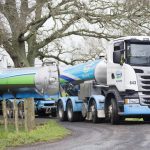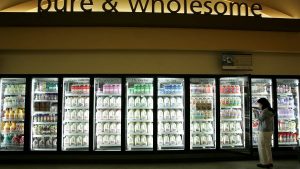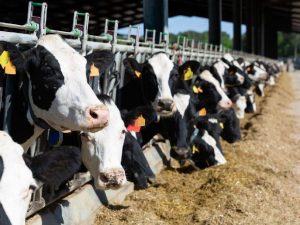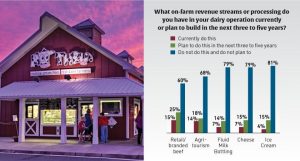
VISALIA — California Dairies, Inc., the nation’s second largest dairy cooperative based in Visalia, is building a facility partially powered by renewable energy where new technologies will be used to extend the shelf life of milk.
Secretary of the California Department of Food and Agriculture Karen Ross and other state and local officials joined California Dairies, Inc. (CDI) on Sept. 29, at a groundbreaking ceremony in northern Kern County at the future site of CDI’s new state-of-the-art milk processing and bottling facility. The 220,000-square foot facility will be built on 30 acres of land near Shafter, Calif. The facility is expected to create approximately 100 new jobs when fully operational in 2023.
“This is an exciting day and marks the launch of a transformational investment being made by our farmer-owners,” CDI’s president and CEO Brad Anderson said as during his opening remarks. “This new facility will process our Kern County-produced milk into innovative fluid milk products that have been seeing growth in demand throughout the U.S. and international markets.”
Named Valley Natural Beverages, the facility will use ultra-high temperature (UHT) and extended shelf-life (ESL) milk processing facility. Stacy Heaton, director of communications for CDI, said both technologies refer to a method of heat-treating fluid milk for pasteurization. By pasteurizing the milk at much higher temperatures, we are able to extend the shelf-life of the product, and in some cases, produce a shelf-stable product that can also be stored and transported without refrigeration. These features create advantages both in storage and transportation logistics as well as preserving product quality and integrity for the consumer.
“While traditional fluid milk will have a shelf-life of three to four weeks, ESL milk can have a shelf life of up to six months, allowing for the product to last longer on the store shelf or in the consumer’s refrigerator,” Heaton said.
The project is being built in northern Kern County, a region with significant milk production but no local processing facilities. Not only will this investment significantly reduce the transportation distances of milk produced in Kern County, it will also further demonstrate CDI’s commitment to sustainable solutions by incorporating renewable energy sources and waste conservation as key priorities in the facility and operational design. Heaton said the facility will partially rely on on-site solar but not all of details of the energy sources have been ironed out. Transportation to and from the facility will include milk tankers pulled by compressed natural gas (CNG) tractors.
“As farmers, we aim to be good stewards of the land to leave a lasting legacy for future generations,” CDI board chairman Simon Vander Woude said. “CDI’s member-farms are leading the way in implementing sustainable on-farm practices, and the construction of this state-of-the-art facility will carry that mission forward.”
CDI and its family-owned dairy farms have a long history of prioritizing on-farm sustainability. In 2011, CDI co-founded Dairy Cares, a leading nonprofit pursuing research and innovation in the area of sustainable dairy practices in California. More recently, CDI has adopted the U.S. Dairy Stewardship Commitment, which aims to be carbon neutral or better by the year 2050.
Co-owned by more than 300 dairy producers who ship nearly 17 billion pounds of Real California Milk annually, California Dairies, Inc. is a manufacturer of quality butter, fluid milk products, and milk powders. In addition, California Dairies, Inc. is the home of two leading and well-respected brands of butter – Challenge and Danish Creamery. California Dairies’ quality dairy products are available in all 50 United States and in more than 50 foreign countries. For additional information on California Dairies, Inc., visit www.CaliforniaDairies.com.
























